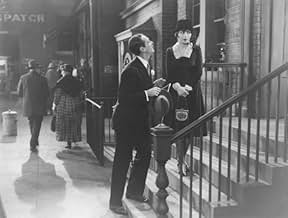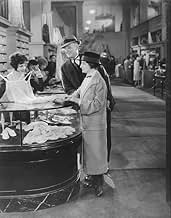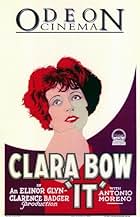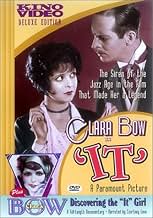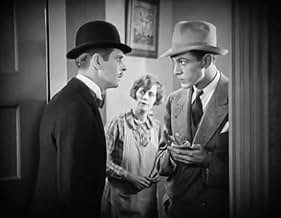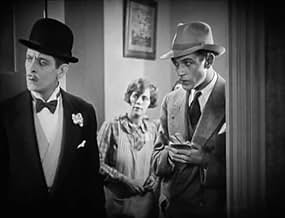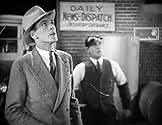AVALIAÇÃO DA IMDb
7,2/10
3,9 mil
SUA AVALIAÇÃO
Adicionar um enredo no seu idiomaA salesgirl pursues a handsome playboy.A salesgirl pursues a handsome playboy.A salesgirl pursues a handsome playboy.
- Direção
- Roteiristas
- Artistas
- Prêmios
- 1 vitória no total
Elinor Glyn
- Madame Elinor Glyn
- (as Madame Elinor Glyn)
Elmo Billings
- Office Boy
- (não creditado)
Gary Cooper
- Newspaper Reporter
- (não creditado)
Lloyd Corrigan
- Yacht Cabin Boy
- (não creditado)
Cheryl Holt
- Baby
- (não creditado)
Eleanor Lawson
- First Welfare Worker
- (não creditado)
Rose Tapley
- Second Welfare Worker
- (não creditado)
Dorothy Tree
- Waltham Employee
- (não creditado)
Avaliações em destaque
Clara Bow's energy and glamour give this otherwise lightweight feature some life, making it quite a bit better than it had any right to be. The rest of the production does have a couple of strengths, but not enough to carry the load. The story is pleasant and generally entertaining, but rather negligible. The "It" theme is overworked, and downplaying it in favor of a little more substance might have improved the movie. Yet it is still certainly worth seeing.
Bow gets a character that allows her to use her strengths while also giving her a chance to do some other things as well, as her character goes through a series of romantic episodes and other experiences. Perhaps one reason why this is one of her best-remembered features is that the role gives her some opportunities to show different sides of her character, as she uses her facial expressions and other resources pretty well.
The rest of the cast is just there for Bow to play off of, and the characters are mostly one-dimensional. Antonio Moreno is solid but sometimes lifeless, and his friend Monty is an annoying character whose only constructive purpose is to advance the plot at a couple of key stages.
One minor asset of the movie is the inter-titles, several of which add a bit of bite to some otherwise trite situations. But the constant references to the "It" concept, which apparently come from the Elinor Glyn source material, get old quickly. It's hardly a very imaginative or significant concept, and a couple of passing references would have been more than enough, so as to allow the story to stand more on its own.
The story itself is told rather well, and there are some enjoyable sequences, especially towards the end. While the whole thing is too superficial to belong on any best-of or must-see lists - especially in a year that produced so many outstanding and significant films - it's a generally entertaining little feature, and it is one of the best showcases for Clara Bow, who was one of the most popular performers of the 1920s.
Bow gets a character that allows her to use her strengths while also giving her a chance to do some other things as well, as her character goes through a series of romantic episodes and other experiences. Perhaps one reason why this is one of her best-remembered features is that the role gives her some opportunities to show different sides of her character, as she uses her facial expressions and other resources pretty well.
The rest of the cast is just there for Bow to play off of, and the characters are mostly one-dimensional. Antonio Moreno is solid but sometimes lifeless, and his friend Monty is an annoying character whose only constructive purpose is to advance the plot at a couple of key stages.
One minor asset of the movie is the inter-titles, several of which add a bit of bite to some otherwise trite situations. But the constant references to the "It" concept, which apparently come from the Elinor Glyn source material, get old quickly. It's hardly a very imaginative or significant concept, and a couple of passing references would have been more than enough, so as to allow the story to stand more on its own.
The story itself is told rather well, and there are some enjoyable sequences, especially towards the end. While the whole thing is too superficial to belong on any best-of or must-see lists - especially in a year that produced so many outstanding and significant films - it's a generally entertaining little feature, and it is one of the best showcases for Clara Bow, who was one of the most popular performers of the 1920s.
When it comes to IT, Clara Bow was in a league of her own. No other actress I've ever seen has even been close(maybe Jean Harlow). But most actresses since Clara didn't have silent films, which allowed her beautiful expressive eyes, facial expressions, and physical gestures (such as looking between the legs of stuffed toy dog) to do her talking and leave no doubt as to her intent. Her ability to do this made her special. I must admit that even though I loved this film, IT isn't my favorite performance by Clara. I happen to think she displayed as much and possibly more "IT" in some of her other silent movies like MANTRAP, HULA, & THE PLASTIC AGE than in IT. If you don't believe that's possible, then I highly recommend checking out some of her other films and judge for yourself. Even if you disagree, you will enjoy these performances if you enjoyed this film. As a whole, I think IT was the strongest of her silent films (in terms of plot, writing, and character development) that I've seen. Regardless, IT is the film for which Clara is most remembered and the favorite of her modern day fans. From Clara's scheming to reel in her boss as a husband to the hilarious sub-titles ("Sweet Santa, give me him", "Hot socks, the new boss", "I'll take the snap out of your garters", "He couldn't give birth to a suspicion", "On the contrary, I think she's got plenty in reserve"), I enjoyed this 1920s romantic comedy tremendously. Could Elinor Glyn, have been trying to promote her book or herself? IT was only defined 3 times during the movie (in the opening credits, in the first scene where Monty is reading about IT, and when Antonio Moreno asks Elinor Glyn herself in a scene about halfway through the film. I think if modern audiences would give IT a chance, they would be pleasantly surprised with Clara Bow. 9/10
Two years after "It" came out the silent picture would be a thing of the past. Still, the most striking thing about this movie, after the always beautiful Clara Bow, is how modern it looks. On the Kino DVD the picture is sharp and clear, with excellent contrast. It looks as good as black and white can.
The story itself is fluff. The It of the title, which translates roughly as sex appeal, is irrelevant to the plot. Salesgirl Betty Lou Spence (Bow) falls in love with owner of big department store Cyrus Waltham, Jr. (Antonio Moreno). She chases him, he chases her, misunderstanding separates them. Even though the plot is light, it fulfills its modest goals well, largely due to Bow's energy. William Austin, as Moreno's friend Monty, is also a high point. In one key scene he also shows himself to be a far more caring and sensitive person than Cyrus, and probably a better choice for Betty's affections. Sadly, that's not how this kind of movie works.
The camera work is pretty sophisticated for the time. The scenes of Betty and Cyrus's date at the beach, with quick cuts as the two laugh, play and fall in love, are now a cliche, although one that's still used. The use of panning, different angles during scenes and plenty of close-ups keep the movie moving, without the long shots before a stationary camera that characterized many indoor scenes during the silent era. Were it not for the lack of sound and the title cards, one could easily think this movie was made as late as the start of WWII.
"It" is not an important movie in the development of cinema, either in terms of technique or theme. Instead, it's an entertaining romantic comedy, largely due to Bow's electrifying screen presence and Austin's satisfying performance. Clara Bow was a huge star, who defined the female sex symbol during the 20s. Even today it's hard to imagine anyone watching her and being able to deny that she does indeed have It.
The story itself is fluff. The It of the title, which translates roughly as sex appeal, is irrelevant to the plot. Salesgirl Betty Lou Spence (Bow) falls in love with owner of big department store Cyrus Waltham, Jr. (Antonio Moreno). She chases him, he chases her, misunderstanding separates them. Even though the plot is light, it fulfills its modest goals well, largely due to Bow's energy. William Austin, as Moreno's friend Monty, is also a high point. In one key scene he also shows himself to be a far more caring and sensitive person than Cyrus, and probably a better choice for Betty's affections. Sadly, that's not how this kind of movie works.
The camera work is pretty sophisticated for the time. The scenes of Betty and Cyrus's date at the beach, with quick cuts as the two laugh, play and fall in love, are now a cliche, although one that's still used. The use of panning, different angles during scenes and plenty of close-ups keep the movie moving, without the long shots before a stationary camera that characterized many indoor scenes during the silent era. Were it not for the lack of sound and the title cards, one could easily think this movie was made as late as the start of WWII.
"It" is not an important movie in the development of cinema, either in terms of technique or theme. Instead, it's an entertaining romantic comedy, largely due to Bow's electrifying screen presence and Austin's satisfying performance. Clara Bow was a huge star, who defined the female sex symbol during the 20s. Even today it's hard to imagine anyone watching her and being able to deny that she does indeed have It.
Nothing earth shattering here, no high art, just pure entertainment! A bit like today's light romantic comedies, but a tad better in a lot of instances! The real star here is Clara Bow who could after all really act and wasn't just another pretty face, although she was that and more! It's not difficult to see why she became a popular personality with her vivacity, energy and contagious charm! The girl just exuded fun! As Antonio Moreno said in the movie, "She has plenty in reserve!" There are some cute lines in the movie, like when Monty says, " I feel so low I'd have to walk on stilts under a dachshund." William Austin is an entertaining secondary character.
The print I saw was in good shape and I enjoyed the high angle shots of the department store at the beginning of the movie with the camera panning down to the street, the amusement park scenes and the scenes on the yacht. Makes me want to see Clara in a serious drama too! Worth watching for Clara to see what It was all about! I don't think It has changed that much even in the present day!
The print I saw was in good shape and I enjoyed the high angle shots of the department store at the beginning of the movie with the camera panning down to the street, the amusement park scenes and the scenes on the yacht. Makes me want to see Clara in a serious drama too! Worth watching for Clara to see what It was all about! I don't think It has changed that much even in the present day!
If there's any question why Clara Bow became one of the top box office stars of the late silent era, "It" answers that question. The film, perhaps the one with which she will always be associated, is indeed a star turn, but a great one.
Bow,playing a counter girl who wins the heart of the owner of the great department store she works, turns in a memorable performance.
She brings everything you could want to the role, from great comic timing to a very robust physical presence. More than anything, of course, she is incredibly photogenic, a magnetic presence that simply lights up the screen.
Most heartening to me was the very large number of people well under 30 who viewed this film with me the night I saw it. They seemed to absolutely loved it.
Bow,playing a counter girl who wins the heart of the owner of the great department store she works, turns in a memorable performance.
She brings everything you could want to the role, from great comic timing to a very robust physical presence. More than anything, of course, she is incredibly photogenic, a magnetic presence that simply lights up the screen.
Most heartening to me was the very large number of people well under 30 who viewed this film with me the night I saw it. They seemed to absolutely loved it.
Você sabia?
- CuriosidadesElinor Glyn gave many confusing and sometimes contradictory explanations for what "It" meant, but she always said that "It" did not mean "sex appeal" necessarily and that anyone who said it did was vulgarizing her concept. Nonetheless, "It" became a euphemism for "sex appeal," which caused that pronoun to be entered into the American lexicon as a noun in the late 1920s.
- Erros de gravaçãoAs Waltham climbs onto the anchor, his shirt sleeve is intact. The scene cuts away to Monty and Adela in the rowboat for a brief moment; however, in the next scene, Waltham's sleeve is completely torn.
- Citações
Monty Montgomery: I feel so low, old chap, that I could get on stilts and walk under a dachshund.
- ConexõesFeatured in The House That Shadows Built (1931)
Principais escolhas
Faça login para avaliar e ver a lista de recomendações personalizadas
- How long is It?Fornecido pela Alexa
Detalhes
Bilheteria
- Faturamento bruto nos EUA e Canadá
- US$ 411.891
- Tempo de duração1 hora 12 minutos
- Cor
- Mixagem de som
- Proporção
- 1.33 : 1
Contribua para esta página
Sugerir uma alteração ou adicionar conteúdo ausente

